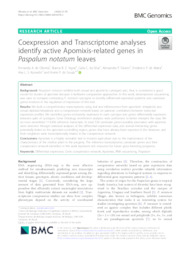Coexpression and transcriptome analyses identify active apomixis-related genes in Paspalum notatum leaves.
Coexpression and transcriptome analyses identify active apomixis-related genes in Paspalum notatum leaves.
Author(s): OLIVEIRA, F. A. de; VIGNA, B. B. Z.; SILVA, C. C. da; FAVERO, A. P.; MATTA, F. de P.; AZEVEDO, A. L. S.; SOUZA, A. P. de
Summary: RNA sequencing (RNA-seq) is the most effective method for simultaneously predicting new transcripts and identifying differentially expressed genes among distinct tissues, genotypes, abiotic conditions and developmental stages [1]. Conversely, considering the large amount of data generated from RNA-seq, new approaches that efficiently extract meaningful associations from highly multivariate datasets are needed [2]. Transcriptome coexpression studies can show how complex phenotypes depend on the activity of coordinated batteries of genes [3]. Therefore, the construction of coexpression networks based on gene expression data using correlation metrics provides valuable information regarding alterations in biological systems in response to differential gene expression patterns [2, 4].
Publication year: 2020
Types of publication: Journal article
Observation
Some of Embrapa's publications are published as ePub files. To read them, use or download one of the following free software options to your computer or mobile device. Android: Google Play Books; IOS: iBooks; Windows and Linux: Calibre.
Access other publications
Access the Agricultural Research Database (BDPA) to consult Embrapa's full library collection and records.
Visit Embrapa Bookstore to purchase books and other publications sold by Embrapa.

